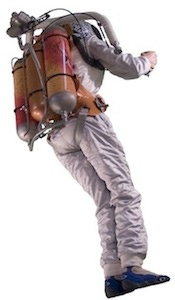August 18, 2011

Agent 007 James Bond has nothing on German engineeringstudent Mario Bohme, who developed a portable jetpack as a fun project.
A rocket drive buckled to the back of a pilot providesthrust for a lift off-at least in theory.
What's particularly interesting about his design is the useof plastic bearings in the overall construction, including in the controlhandles and in the system that bears the pilot's weight.
"I considered other materials, but the plastic bearings hadthe lowest weight and will show less failure based on corrosion processes,"says Bohme. The propulsion reaction generates corrosive gases that are moredamaging to metal than the specially developed plastic compound used in the bearings.
A plastic rod end bearing holds the whole rocket assemblytogether and covers the pilot's weight. "If this bearing fails, the rocketassembly will separate from the pilot - the pilot will fall down," says Bohme."So it must be proven that the bearing can cover the stress during the flight.For safety reasons the bearing will be replaced after a couple of flights."
The temperature for the bearings in the jetpack will notexceed 40C (104F), according to Bohme.
"The whole project was planned, designed and built by justone person - me," says Bohme. "Some parts were bought as off the shelf parts,but this was just a handful. The other parts were designed and calculated bymyself with the latest CAD technology I could use at my university."
Bohme worked on the project for more than five years withoutany sponsors. "Now I'm looking for sponsors to get enough money to get thejetpack into the sky and improve my personal handling of the flying system. Thefuel is the most expensive part at this stage," says Bohme.
The project was recognized as part of the manus 2011 awards programheld by igus GmbH.Igus developed the manus program to showcase innovative uses of plasticbearings.
Igus develops tribologically optimized material compoundsdesigned for low wear and long life. They are widely used as bearings and cablecarriers.
All of the igus technology is in house and very proprietary -even the identity of base polymers and particularly the compounds andcompounding methods. It is known from company literature that polymer familiesused include polyamide 6, 66 and PEEK (polyetheretherketone). Reinforcementsinclude glass and carbon fiber, as well as a newly developed nanomaterial.
A 2011 winnerin the Design News Golden Mousetrapcompetition is an advanced tribological polymer from igus using nano-sizedparticles. Use of nanotechnology improves the lifetime of its high-performanceplastic plain bearing predecessors by a factor of six, according to igus.
The company manufactures its own tooling and operates severalhundred molding machines at its home base in Cologne, Germany. These moldingmachines make parts used for products assembled in Germany, East Providence, RIand elsewhere and are shipped globally.
"The biggest battle we still have is convincing engineers thatplastics can do a better job than steel as bearings," bearings unit manager TomMiller commented in an interview with DesignNews at the company's Rhode Island location. "One thing we run into is anengineer who says 'We tried plastics 10 years ago and it didn't do the job.'"
As in all technical applications - and particularly forbearings - it's critical to make sure you have the right plastic formulationand that the parts are stress-free and made to the correct tolerances. Millersays that a lot of molders are selling plastic bearings that aren't up tosnuff.
One of the big benefits of igus plastic bearings is thatthey run dry - no external lubricants are required. That makes them goodcandidates for machinery used to process food or pharmaceuticals. Also,according to Miller, no maintenance is required. They also operate much quieterthan metal bearings. And as Mario Bohme found, they are much lighter than metalbearings and the right compounds offer good chemical resistance.
Bearings made from PEEK compounds can take thermalconditions up to 600C (482F).
Miller says, however, that plastic bearings are notrecommended for continuous heat, including applications such as fans.
About the Author(s)
You May Also Like





